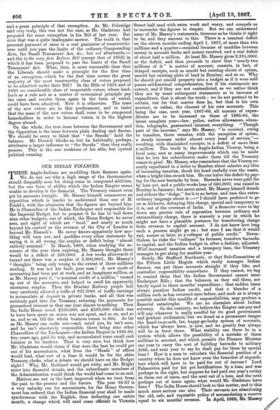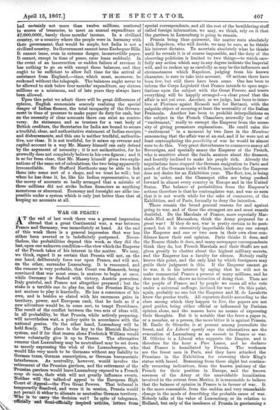OUR INDIAN FINANCES.
THESE Anglo-Indians are muddling their finances again. We do not see why a high range of the therfnometer should disqualify men for doing sums in compound addition, but the one form of ability which the Indian Empire seems unable to develop is the financial. The Treasury cannot even get its accounts straight. Mr. Massey himself commences an exposition which is harder to understand than one of M. Fould's, with the admission that the figures are beyond him. He is Chancellor of the Indian Exchequer and responsible for the Imperial Budget, but to prepare it he has to boil down nine other budgets, one of which, the Home Budget, he never sees, and eight of which are "local," and nearly as much beyond his control as the revenue of the City of London is beyond Mr. Disraeli's. He never knows apparently how any- thing will turn out, and qualifies every other statement by saying it is all wrong, the surplus or deficit being "almost entirely nominal." In March, 1866, when studying the ac- counts of the year then expiring, Mr. Massey thought there would be a deficit of 336,000/. A few weeks afterwards it turned out there was a surplus of 2,800,0001., Mr. Massey's " thoughts " being only wrong to the extent of three millions sterling. It was not his fault, poor man! A new mode of accounting had been put at work, and an imaginary million, or as Mr. Massey puts it, "a nominal credit of a million," turned up out of the accounts, and helped to swell his apparently enormous surplus. Then the Bombay Railway people had very carelessly allowed a trifle of 937,000/. of traffic earnings to accumulate at deposit in private banks, and all that was suddenly paid into the Treasury, reducing the payments for guaranteed interest in that one year almost to nothing. Then the India House saved £350,000, and £566,000 which was to have been spent on stores was not spent, and so on, and so on, and so on, till the whole business comes to this. As far as Mr. Massey can make out—and, mind you, he isn't sure, and he isn't absolutely responsible, there being nine other Chancellors of the Exchequer—the Indian Empire in 1865-66, two years ago, paid its way, and accumulated some small cash balance at its bankers. That is very nice, but think how Mr. Gladstone would storm if that were the best he could get out of his accountants, what lives the "Heads" of offices would lead, what sort of a time it would be for the abler Treasury clerks, what a debate we should have on the Bridget night ! Why, Mr. Hubbard would get witty, and Mr. Bright enter into financial details, and the subordinate members of the Administration would think the world had come to an end.
Matters are not in the least improved when we turn from the past to the present and the future. The year 66-67 is a very unlucky one for accountants, for the Home Govern- ment has ordered that the Indian financial year shall be made synchronous with the English, thus deducting one entire month, a change which will send some officials in Victoria Street half mad with extra work and worry, and compels us to surrender the figures in despair. But we can understand some of Mr. Massey's statements, tiresome as he thinks it right to be, and they amount to this. There is a nominal deficit on the eleven months ending April 1, 1867, of more than two millions and a quarter—nominal because of muddles between money in account books and money received, and a real deficit of about half a million. At least Mr. Massey gives 2,395,0001. as the deficit, and then proceeds to show that "nearly two millions of it" is matter of account, consists, in fact, of delayed receipts, such as unsold but existing chests of opium, unsold but existing plots of land in Bombay,- and so on. Why he should put unsold property into a budget as if it were sold passes arithmetical comprehension, but if his statements are correct, and if they are not contradicted, as we rather think they are by some subsequent statements as to increase of expenditure, that is about the truth ; we do not pretend to be nor for that matter does he, but that is his own account, or rather, the clearest of his own accounts. This being the case, next year, 1867-68, all manner of expen- ditures are to be increased on those of 1865-66, the complete year—law, police, native allowances, educa- tion, telegraphs, guaranteed interest, everything. "Though part of the increase," says Mr. Massey, "is nominal, owing to transfers, there remains, with the exception of opium, a steady increase under almost every head of service,"— resulting, with diminished receipts, in a deficit of more than a million. The truth is, the Anglo-Indian Viceroy, being a local man, sees so many improvements which can be made- that he lets his subordinates make them till the Treasury comes to grief. Mr. Massey, who remembers that the Viceroy re- cently repudiated in a letter to Bombay about salaries any idea of increasing taxation, shook his head ruefully over the waste, when a bright idea struck him. He can halve the deficit by pay- ing for the new barracks by loan. Barracks neverwere paid for by loan yet, and a public works loan of 600,000/. was raised in Bombay in January; but never mind. Mr. Massey himself dreads and abhors the "dodge," for it is no better, and uses this extra- ordinary language about it :—" I should have preferred to go on as hitherto, defraying this charge, special and temporary as it is, out of the revenues of India. If a financier were to lay down any precise rule of separation between ordinary and extraordinary charge, there is scarcely a year in which he- might not have a plausible pretence for transferring charge from revenue to capital account. I do not know how long such a process might go 'on; but sure I am that it would end, sooner or later, in a collapse of public credit." Never- theless, he risks the "collapse" he foresees, transfers barracks to capital, and the Indian budget is, after a fashion, adjusted. With increased taxation and a trumpery loan, the Treasury manages to get along for another year. Surely, Sir Stafford Northcote, or that Sub-Committee of the Fifteen Little Moguls -which really manages Indian. finance, can put these accounts straight if they like, and centralize responsibility somewhere. If they cannot, we beg to remind them that the Indian Government cannot issue Exchequer Bills ; that the balances, as they call them, are barely equal to three months' expenditure ; that sudden loans always paralyze Indian credit, and that a blunder of a million such as has occurred once before, and such as is always- possible amidst this muddle of responsibilities, may produce a. financial catastrophe. We are no alarmists about Indian solvency. On the contrary, we believe the Empire can pay and. will pay whatever is really needful for its good government and gradual civilization;-but we dread as a permanent danger the hand-to-in oath, lax, happy-go-lucky system of accounts, which haelIways been, is now, and we greatly fear always will be in force there. What stability can there be in a system which allows the possibility of a mistake of three- millions in account, and which permits the Finance Minister one year to carry the cost of building barracks to military. debit, and next year to say he shall pay for them by special loan f How is a man to calculate the financial position of a country when he does not know even the branches of expendi- ture which will have to be paid for out of income? Lord. Palmerston paid for his pet fortifications by a loan, and was perhaps in the right, but suppose he had paid one year's outlay on them out of taxes, and the next out of a loan, and the next- perhaps out of taxes again, what would Mr. Gladstone have done? The India House should look to this matter, and to this much more serious one also. Their servants are abandoning the old, safe, and reputable policy of accumulating a reserve equal to six months' revenue. in April, 1866, Mr. Massey had certainly not more than twelve millions, scattered in scores of treasuries, to meet an annual expenditure of 47,000,000/., barely three months' income. In a civilized country, or-a country where the people -were in harmony with their government, that would be ample, but India is not a civilized country. Its Government cannot issue Exchequer Bills. It cannot issue, even in extreme danger, inconvertible paper. It cannot, except in time of peace, raise loans suddenly. In the event of an insurrection or sudden failure of revenue it has nothing to go on with except these balances, and they ought to be sufficient to allow full time for the arrival of assistance from England,—time, which must, moreover, be reckoned without the telegraph. The balances ought never to be allowed to sink below four months' expenditure, say sixteen millions as a miniraum, and of late years they always have been allowed.
Upon this point we admit there will be great differences of opinion, English economists scarcely realizing the special danger of Indian finance, the total incapacity of the Govern- ment in time of pressure to make paper do duty for cash, but on the necessity of clear accounts there can exist no contro- versy. As statesmen and as trustees for -a vast body of British creditors, the Secretaries for India are bound to secure a truthful, clear, and authoritative statement of Indian receipts and disbursements, and this one is neither truthful, authorita- tive, nor clear. It is not truthful, for it mixes up revenue and capital account in a way Mr. Massey himself can only defend by the argument of 'necessity; it is not authoritative, for he avowedly does not completely believe in his own figures ; and it is so far from clear, that Mr. Massey himself gives two expla- nations of the same set of calculations, the two being apparently irreconcilable. Sir Stafford Northcote may be able to lick them into some sort of a shape, and we trust he will ; but when he has done it, he, like his Indian representative, is at the mercy of accounts so badly arranged that a mistake of three -millions did not strike Indian financiers as anything monstrous or abnormal. Economy and foresight are alike im- possible under a system which is only just better than that of, -keeping no accounts at all.































 Previous page
Previous page